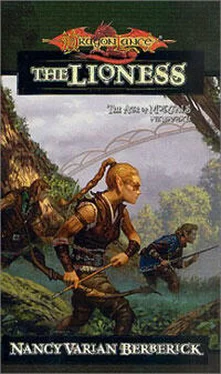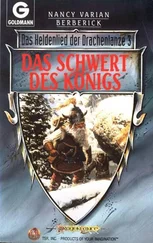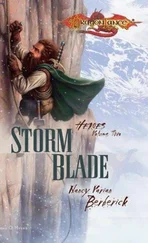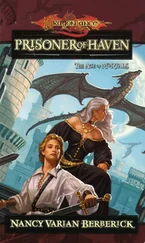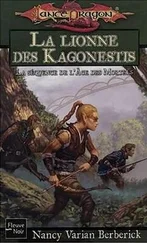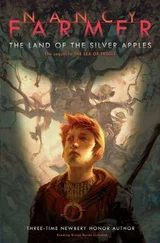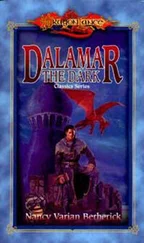Kerian shook her head. “Yes, you do. Ayensha isn’t here, and you know where she is, so you know where my brother is. Where is Dar?”
She watched him thinking and watched him choose. He’d held faithful to her trust after she’d gone, without notice, to Thorbardin. He’d done better than that: He’d tried to build the core of what would now become—if all gone gods were good!—the terror of Thagol’s Knights. Yet she saw it now, again as she had a year ago. Jeratt had a deeper allegiance to her brother, to Iydahar who did not trust her or like her king.
“Who is he to you, Jeratt?”
The question surprised him. “Dar? He’s my friend.”
She snorted, unbelieving. “He’s more than that. I’ve seen how you are when he’s around—all of you. It’s like he’s a … I don’t know, priest or shaman.”
Jeratt sat a long time quiet, poking at the fire, chasing bright orange cinders up to the sky. Kerian watched him; she looked at the guards on the hill, then at Jeratt again.
“He’s none of those, Kerian. He’s—he was a man of the prince. He fought beside Porthios, and when the prince vanished and most of Dar’s folk went away into the forest, Dar stayed. You don’t know, Kerian. Maybe you don’t remember how hard the winter was that year, you in your towers at Qualinost. Maybe you looked out your window and saw the snow falling and you thought it was pretty.” He stopped, his eyes gone suddenly hard. “Maybe you scurried out from the silks and the satins of your lover’s bed and thought how cold the floor was when your little foot missed the carpet.”
Kerian drew a breath, sharp and swift.
“Dar is the one who gathered up all of the prince’s broken men and found us shelter in a winter that would have killed us. Broken bones, broken hearts, broken spirits. He took us all as his, when he could have gone away with his kin, with your father and mother and the White Osprey tribe. He healed us and helped us, and when the spring came and he did go away to be with Ayensha and her folk, he never forgot us. He brought us news, just like in that terrible winter he brought us food and healing. In all the years, though we fought for no cause but our own anger and greed, your brother never let us go afoul of the Knights we hate if he could help it, and one day he brought us Elder to keep and care for ….”
In silence, he poked at the fire again. In silence, he watched the embers, light flowing across them, like fire breathing.
“He was our brother in arms, Kerian. We were sworn to the prince, and that’s like we were born of the same kin. Dar never forgot that. We owe him everything, and though we’ve sworn to your cause—I’m sorry to say it, we don’t owe you him. Dar wants no part of you, your cause, or your king, and there’s no persuading him. I ain’t going to be the one to go against him. Now, Ayensha will be back in the morning, so you go get some sleep now. We got a bit of work ahead of us, eh?”
Ayensha would be back, so he’d said, but in the morning she didn’t come. Neither did she on the morning after, or the one after that, and on the fourth morning, Jeratt said no more than that the girl must have come to her senses.
“She learned she is childing in the time you were gone. She’s come to her senses now and will not be following you to war.”
He lay upon a bed of bracken, the Skull Knight among his men. They’d made camp in the forest, out of sight of the Qualinost Road heading west. Watch had been posted and turned twice before he’d finally settled to sleep. The forest smelled of fern and earth, and down a thin wind, distantly of draconian. He never let those creatures camp near his Knights. They disgusted most humans, and black-armored Knights were no exception.
Thagol closed his eyes. His disciplined mind let go of the thoughts and concerns of the day. He had plotted his next strike, scouted the village, and deployed his men. It would be a fiery morning, this he trusted. In Gilianost lived a taverner who had given shelter to one of the outlaws, a half-elf on the run from two of Thagol’s Knights. The taverner would find that offense costly.
Thagol settled, and though he had not lain upon a true bed in a month, still he settled easily. He didn’t miss Qualinost, that warren of elves, the very scent of whom turned his stomach. He lay upon the forest floor, the hard earth that hated the very touch of his body, that loathed the sound of his voice. As willingly as he hated Qualinesti, so did Sir Eamutt Thagol imagine the forest hated him.
In the deepest part of his sleep, then, he went out walking. Sir Thagol went out from his body and traveled on the roads of dreaming and through the deep places of sleeping minds. It was no unusual journey for him, and he found no unusual thing. When he woke, the soft gray light before the dawn in his eyes, Sir Thagol had the feeling that something had changed in the forest.
It was a feeling he knew, akin to the air of a barracks when warriors are called to muster.
Sorrow drifted like ghosts through the forest. Villages lay in ash and ruin. Heads were posted everywhere as warnings. In the little towns untouched by Lord Thagol and Chance Headsman’s blighting hands, people shunned the rebels now. Kerian’s name was known in every quarter of the forest now, as was the price for her head. The Skull Knight did not offer steel, gems, or precious metals. He offered nothing. He promised death to all he looked upon until she was brought to him, alive for killing.
At farms where once they had been welcomed, no one dared open a door to Kerian, Jeratt, or any of the Night People. In this forest now, all strangers were suspect, any traveler going by could be one of the resistance fighters Lord Thagol hunted. Anyone could lose his head on the mere suspicion that he’d given aid to one of them.
“He doesn’t know where I am,” Kerian reminded Jeratt. They had hunted well, and thanks to Stanach’s deft hand with a snare, they had five fat rabbits to spit. A clear cool stream ran nearby. “Right now, this moment, he can’t even guess.”
Stanach said he wondered how she knew that. Kerian and Jeratt exchanged wry grins as she tapped her forehead.
“I know.” She pulled the bloodstone out of her shirt. “This hides me from him, but if I kill, it doesn’t keep him from knowing I’m around. I haven’t killed. I don’t feel him in my head. He doesn’t know where I am.”
The dwarf grunted skeptically, then sat in silence for a while. Then, “When are you taking me to Qualinost?”
Kerian leaned close to the fire, to the warmth, for the night was chill.
“You’ve seen this place,” she said. “You’ve seen what Thagol and Chance Headsman are doing. Do you think I could get you as far as Qualinost?”
Stanach snorted. He was a long time quiet, his face, his eyes above his black beard gone still as he cradled his ruined right hand in the palm of his left.
“In good time,” said Kerian.
Jeratt grinned. “And we’ll get you there with your head still sitting on your shoulders.”
Stanach turned his head this way and that, as though trying to loosen a kink in his neck. “I’d appreciate that.”
The fingers of his left hand curled round the haft of his keen-edged throwing axe as he stood to take the first watch. Beyond the fire, he looked at Kerian, a long, considering moment. He thought about the serving girl he’d met in the forest, perhaps not far from here, two years ago. She had been a tender creature then, soft hands, perfumed hair. Now here she sat, a leader of a shadowy force of warriors known as Night People. She crouched before her forest hearth, in leather boots and woolen trews, a shirt a man might wear. Her tattoos shone in the light, and it seemed to Stanach she had as much of the forest about her as the owl now sailing the night between the trees.
Читать дальше
